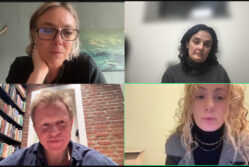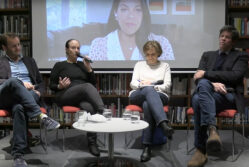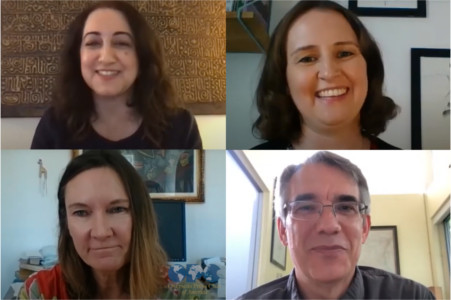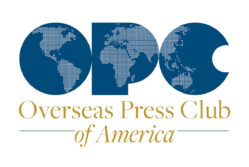Event Coverage Highlight

OPC Launches Interview Series With Hal Boyle Award Winners
by Chad Bouchard
As the United States and European Union close their doors to migrants and tighten immigration policies, money that Western countries donate to “outsource” handling of the crisis has benefited militant groups in Libya, organized crime syndicates in Mexico, and tribal leaders in Yemen. That trend was the focus of the winning entry for this year’s Hal Boyle Award, titled “Outsourcing Migrants,” an investigative series from The Associated Press.
On May 27, the OPC hosted a Q&A session with this year’s Hal Boyle Award winners, kicking off a series of online discussions with OPC Award Winners via Zoom.
Panelists included three of the eight journalists who worked on the series: Lori Hinnant, Tim Sullivan and Julie Watson.
OPC Governor Farnaz Fassihi, head judge of the Hal Boyle Award for best newspaper, news service or digital reporting from abroad, moderated the discussion.
Fassihi said the series incorporated investigative work from a team of print, video and digital journalists, whose work “brought into focus how Western policies in Washington, in the European Union, contributed to this migrant crisis.” The series included reporting from Latin America, the Middle East and North Africa, but she added that despite the sweeping scope of reporting in the series, each article managed to remain centered on human stories.
Lori Hinnant, who covers international security for the AP from Paris, wrote about misuse of 100s of millions of Euros in donations from the EU in Libya that in some cases contributed to migrants being beaten, tortured and sold into slavery.
“It seemed to me that there was this enormous slush fund going who-knew-where, and it quickly became apparent that Libya was the largest recipient of this enormous fund, followed closely by Niger.”
She and colleague Maggie Michael pored over budget documents and found that companies named as recipients “did not exist anywhere.” The team focused on a center in Tripoli run by the United Nations and funded by the EU that was supposed to be an alternative detention center for migrants, but found that with little oversight the money was laundered in Tunisia and ended up in the pockets of people feeding on the system, such as a militia leader who had been torturing and staving migrants.
She said the UN Refugee Agency changed its policy as a result of their reporting, banning direct payments to Libyan partners for handling of migrants. The UN center they had investigated in Tripoli closed down soon after amid chaos and civil war.
Julie Watson, who is based in San Diego and covers the U.S.-Mexico border and Latin America, wrote about the Trump administration’s policies to outsource care of asylum seekers to Mexico.
“This is unprecedented to send asylum seekers back across the Mexico border to wait out their court dates, and most of them are staying in either in shelters or border cities that are dangerous, or they pack themselves into low budget rooms in hotels.” She said many spend up to a year “in purgatory,” scared to leave their temporary homes.
Tim Sullivan, a veteran foreign correspondent with more than two decades of experience covering West Africa and Asia, reported on the story from Mexico and Honduras. He said he worked with AP colleagues in El Paso, Texas, and the team embedded themselves for about 10 days with a colony of more than 100 migrants from around the world, many from African countries, who were stuck in limbo just over the border in Juárez.
“In large part their story was one of just excruciating boredom and fear. And they spent their days just locked, for their own protection to a degree, inside this shelter just trying to get by and hoping that the next day would bring something different.”
Related Events




